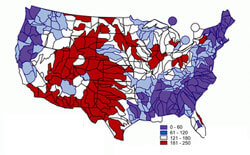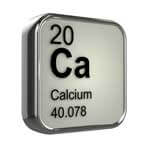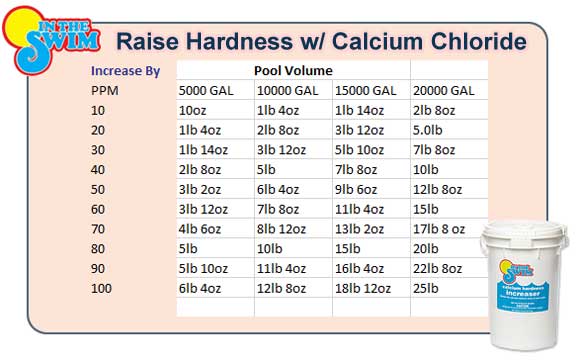FREE Standard Shipping On All Orders $100 or More!*
Soft Pool Water: Low Calcium Levels
Today’s discussion centers on soft water in swimming pools, or pool water that tests low for Calcium Hardness levels.
You can test your tap water too for Calcium Hardness with your pool test kit or test strips Many areas have tap water at 200-400 ppm Calcium Hardness, which is perfect for pool water.
Some parts of the country have problems with very Hard Pool Water while others have tap water of less than 100 ppm hardness. So then class, our question today is "Are low hardness levels (aka soft water) a problem for pools?"
Soft Water is Aggressive Water:

It's a mistake to think of soft water as 'fluffy', although it is more prone to foaming and sudsing - soft water is water that is low in calcium and other minerals, and will seek out mineral sources and attempt to dissolve those sources, in an effort to satisfy its hunger for minerals.
In other words, soft water will actively attempt to draw calcium and other minerals from pool plaster and grout surfaces. It actually leeches the minerals directly from cement compounds used in a concrete pool, which over time weakens the pool.
And in inground vinyl pools, calcium can literally be pulled through the walls, from soils behind the wall. This explains a white calcium scale coating steel pool walls, noticed when an inground vinyl liner is replaced.
Yes, soft water is quite aggressive. Perhaps you have heard the term "Water, the universal solvent" before. When water is soft, it works harder to dissolve whatever it touches, to satisfy mineral cravings.
Soft Water weakens Vinyl Liners:

I saw your hand up there, and anticipated this question from a vinyl pool owner. I am aware that certain sites basically say that you can ignore low calcium hardness levels in vinyl pools.
From my experience, I can say that very soft water is no friend to vinyl liners, and hardness levels in the range of 50-100 ppm can result in liners losing their elasticity as plasticizers are literally sucked out by pool water thirsty for minerals.
We recommend a minimum of 150 ppm of calcium hardness for vinyl liner pools, to maintain optimum water balance, and to protect soft vinyl pool liners.
Soft Water Corrodes Metal:
For those of you with a pool heater, soft water is known to be corrosive to soft metals like a copper heat exchanger, leading to pinhole leaks that require expensive repair.
Soft water also corrodes other metal surfaces around the pool, on ladders and hand rails, and underwater lights. There are also metal components in pool cleaners and pool pumps as well as soft rubbers.
All the soft and shiny bits to any pool can be attacked by low calcium hardness levels. Here's a chart to calculate how much calcium chloride to add to the pool.

Soft water is quite aggressive. Perhaps you have heard the term "Water, the universal solvent" before. When water is soft, it works harder to dissolve whatever it touches, to satisfy mineral cravings.
Do your pool a favor? Test the Calcium Hardness level in your pool every month, and add if needed. The ideal range for swimming pools is 200-400 ppm, with 150 ppm the absolute minimum.
Ignore pool hardness at your own peril! OK, it's not that dramatic, but for the best water balance and sanitation, to protect your soft and shiny pool surfaces, and for the most comfortable swimmers - check the calcium!